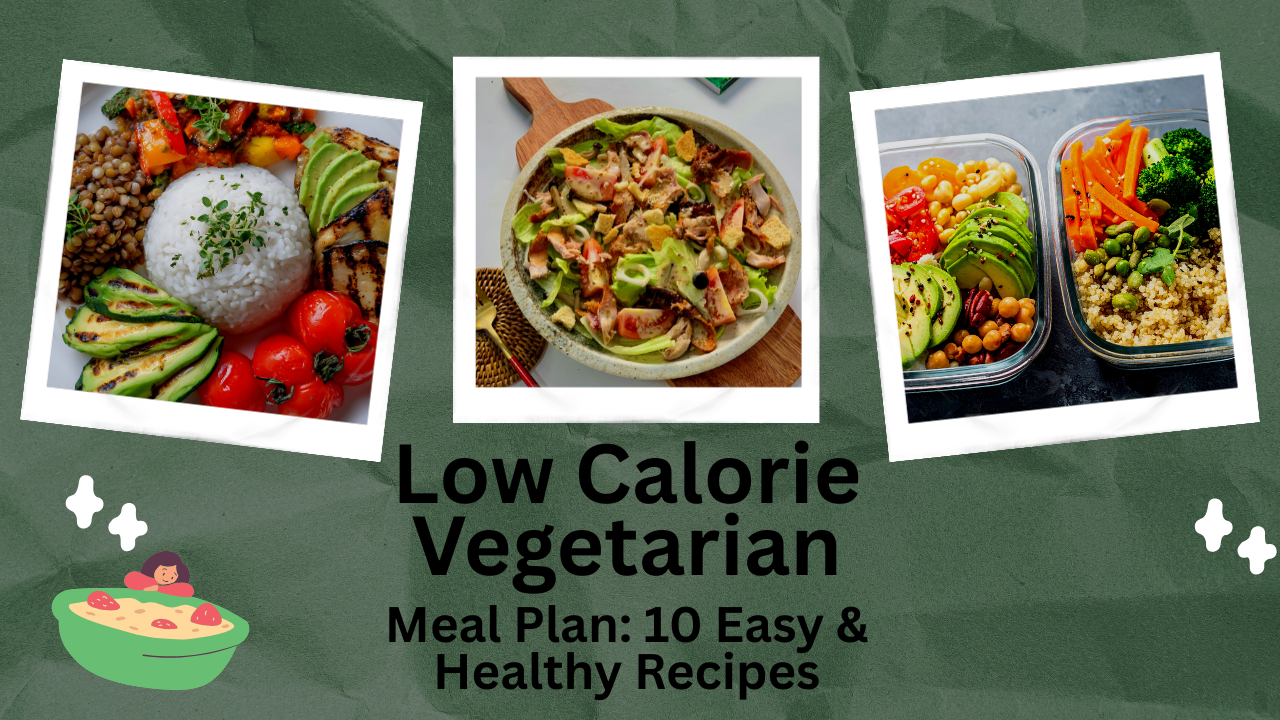In today’s fast-paced world, maintaining a healthy diet has become more important than ever. One of the most effective ways to achieve a balanced lifestyle and manage weight is by following a low calorie vegetarian meal plan. 🌿 Unlike traditional diets, a well-structured vegetarian plan focuses on nutrient-dense, low-calorie foods that promote overall wellness while reducing excess calorie intake. By emphasizing vegetables, fruits, legumes, and whole grains, this approach ensures that your body receives essential vitamins and minerals without overloading it with unnecessary calories.
Adopting a low calorie vegetarian meal plan is not just about losing weight—it is about nurturing your body in a sustainable and enjoyable way. Many individuals often associate low-calorie diets with bland meals or hunger pangs, but with the right planning, a vegetarian approach can be delicious, fulfilling, and exciting. From colorful salads and hearty soups to protein-rich legumes and wholesome grains, there is a wide variety of meals that can fit perfectly into a low-calorie framework. The focus here is on creating meals that are satisfying, nutritionally rich, and easy to prepare, making it suitable for busy lifestyles.
Moreover, following a low calorie vegetarian meal plan can have long-term health benefits beyond weight management. Studies have shown that plant-based diets help reduce the risk of chronic diseases such as heart disease, diabetes, and certain cancers. 🌟 By consciously choosing nutrient-dense, low-calorie options, you not only maintain a healthy weight but also boost your energy levels, improve digestion, and enhance mental clarity. This article will guide you step-by-step through the what, why, and how of adopting a low calorie vegetarian meal plan, along with practical tips, meal ideas, and frequently asked questions to help you make informed choices.
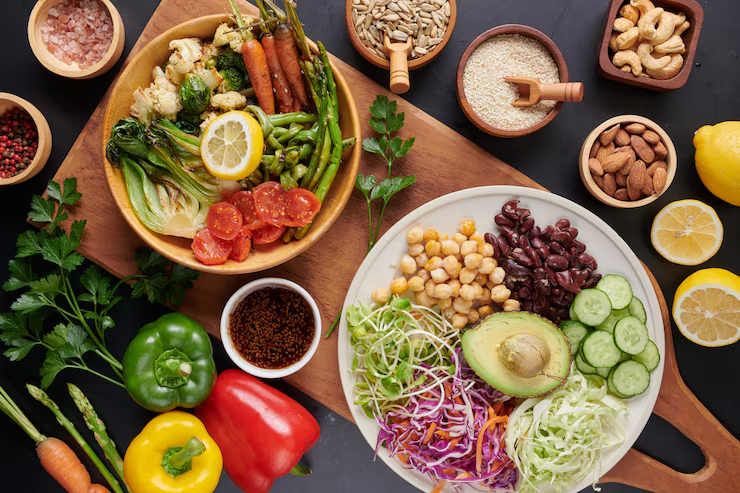
What is a Low Calorie Vegetarian Meal Plan?
A low calorie vegetarian meal plan is a structured dietary approach that emphasizes plant-based foods while controlling calorie intake. The primary objective is to provide essential nutrients such as protein, fiber, vitamins, and minerals while keeping total calories at a moderate level to promote weight management and overall health. Unlike standard vegetarian diets that may include high-calorie foods like cheese, fried snacks, and refined grains, a low-calorie plan focuses on lean, whole foods that are nutrient-dense and filling. 🌱
The core components of a low calorie vegetarian meal plan include a variety of fresh vegetables, fruits, legumes, whole grains, nuts, and seeds. Each meal is carefully designed to balance macronutrients—proteins, carbohydrates, and healthy fats—ensuring that your body receives energy without unnecessary calorie surplus. Proteins can come from beans, lentils, tofu, and tempeh, while complex carbohydrates from quinoa, brown rice, and oats provide sustained energy. Healthy fats from nuts, seeds, and avocados are included in moderation to support brain function and hormonal balance.
Implementing a low calorie vegetarian meal plan also involves mindful meal preparation and portion control. This is essential to prevent overeating, even with healthy foods. By strategically combining ingredients, you can create meals that feel satisfying while maintaining a calorie deficit, which is key for weight loss or maintenance. 🌟 Additionally, this plan encourages hydration, fiber intake, and a wide range of antioxidants from colorful vegetables and fruits. Overall, a low calorie vegetarian meal plan is more than just dieting; it’s a lifestyle choice aimed at improving health, enhancing energy, and promoting longevity in a sustainable, enjoyable way.
Why Choose a Low Calorie Vegetarian Meal Plan?
Choosing a low calorie vegetarian meal plan offers numerous health, environmental, and lifestyle benefits. First and foremost, it aids in weight management by promoting a calorie deficit while ensuring the body receives all essential nutrients. Unlike crash diets or extreme calorie restrictions, this plan is sustainable and does not compromise energy levels or well-being. 🌿 People who adopt this approach often report higher satiety, reduced cravings, and improved metabolic function, making it easier to maintain a healthy weight over the long term.
Another compelling reason to follow a low calorie vegetarian meal plan is its positive impact on cardiovascular health. Research shows that plant-based diets reduce LDL cholesterol levels, improve blood pressure, and lower the risk of heart disease. By limiting high-calorie, processed foods and focusing on nutrient-dense vegetables, legumes, and whole grains, you can improve heart health while managing weight effectively. 🥦 Additionally, the fiber content in these meals supports digestive health, prevents constipation, and encourages a healthy gut microbiome, which is essential for overall wellness.
Beyond personal health, choosing a low calorie vegetarian meal plan also benefits the environment. Plant-based diets have a lower carbon footprint compared to meat-heavy diets. By reducing animal product consumption, you help conserve water, reduce greenhouse gas emissions, and support sustainable farming practices. 🌏 Moreover, this plan encourages mindfulness around food choices, fosters creativity in the kitchen, and enhances awareness of portion sizes and nutritional content. For anyone looking to achieve a balanced lifestyle, improve physical health, and make environmentally conscious choices, a low calorie vegetarian meal plan is a practical, effective, and enjoyable solution.
Essential Points to Include in a Low Calorie Vegetarian Meal Plan
Prioritize Fresh Vegetables and Greens 🥗
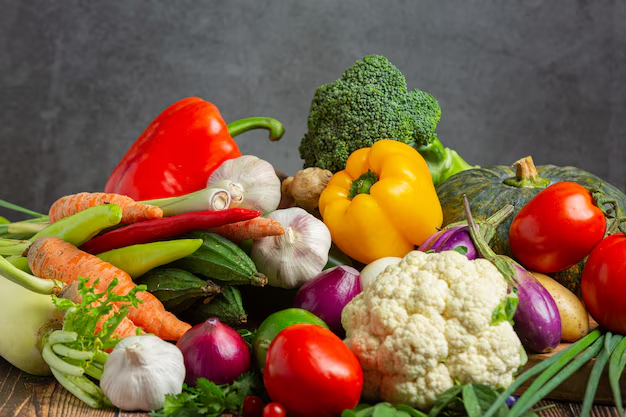
Vegetables and greens are the cornerstone of any low calorie vegetarian meal plan. They are naturally low in calories but high in essential nutrients, including vitamins, minerals, and antioxidants. Leafy greens like spinach, kale, and romaine lettuce are rich in iron, calcium, and folate, which support bone health, energy production, and overall wellness. Colorful vegetables like bell peppers, carrots, and tomatoes are packed with vitamin C and beta-carotene, which promote immunity and healthy skin. By making vegetables the main focus of your meals, you can reduce calorie intake while ensuring your body receives the nutrients it needs.
Incorporating fresh vegetables in multiple forms, such as salads, stir-fries, and steamed dishes, adds variety and makes your low calorie vegetarian meal plan enjoyable. For example, a hearty mixed vegetable stir-fry with broccoli, bell peppers, and zucchini can serve as a filling lunch or dinner. Adding seasonal greens ensures freshness and enhances nutrient diversity. 🌿 Moreover, cruciferous vegetables like broccoli, cauliflower, and Brussels sprouts support detoxification and improve digestive health, making them a must-have in your low-calorie vegetarian meals.
Consistently prioritizing vegetables also helps you feel fuller for longer. Fiber-rich vegetables slow digestion, prevent overeating, and contribute to healthy gut bacteria. By emphasizing vegetables and greens in your low calorie vegetarian meal plan, you can create meals that are satisfying, low in calories, and rich in essential nutrients, which ultimately supports weight management and long-term health.
Include Protein-Rich Plant Foods 🌱
Protein is a critical component of a low calorie vegetarian meal plan, as it supports muscle maintenance, metabolism, and satiety. Plant-based protein sources such as lentils, chickpeas, beans, tofu, tempeh, and edamame are nutrient-dense and low in calories, making them perfect for weight management. Consuming sufficient protein helps prevent muscle loss during calorie restriction and promotes a feeling of fullness, reducing the likelihood of snacking on high-calorie foods.
Incorporating protein-rich meals throughout the day ensures your body gets a steady supply of amino acids. For instance, a lentil and quinoa salad with fresh herbs can be a fulfilling lunch, while tofu or tempeh stir-fries make an excellent dinner option. 🌟 Combining different plant proteins, like rice and beans, provides complete protein and balances your low calorie vegetarian meal plan.
Additionally, protein supports numerous bodily functions beyond muscle health. It helps regulate hormones, boosts metabolism, and aids in tissue repair. By including protein-rich plant foods in your low calorie vegetarian meal plan, you ensure that your meals are not only low in calories but also nourishing, sustaining, and satisfying.
Opt for Whole Grains Over Refined Carbs 🍚
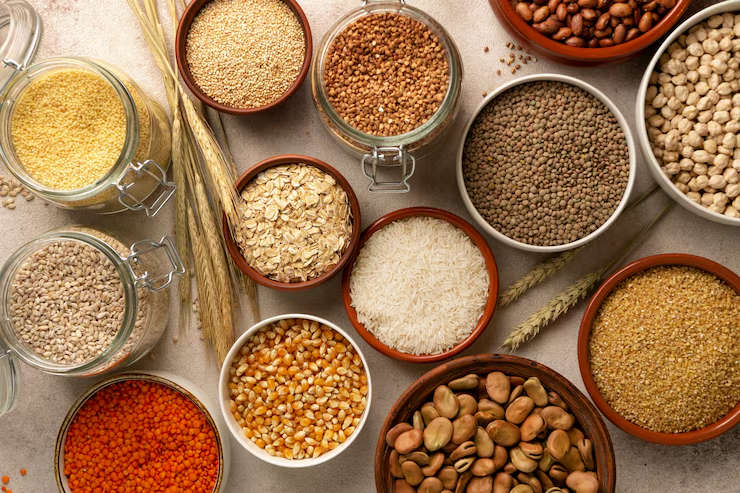
Whole grains are an essential part of a low calorie vegetarian meal plan, as they provide sustained energy, fiber, and essential nutrients. Unlike refined carbs, which can spike blood sugar and contribute to weight gain, whole grains such as brown rice, quinoa, oats, barley, and whole wheat offer a slow-release source of energy, keeping you full longer. They also contain B vitamins, iron, magnesium, and antioxidants that support overall health.
For breakfast, a bowl of oatmeal topped with berries and chia seeds is a simple, low-calorie, nutrient-dense option. 🌿 For lunch or dinner, quinoa or brown rice with vegetables and lentils creates a balanced, satisfying meal. Including whole grains in your low calorie vegetarian meal plan ensures that your energy levels remain stable while helping you avoid unnecessary calorie intake from refined foods.
Additionally, whole grains contribute to digestive health due to their high fiber content. Fiber helps maintain healthy bowel movements, promotes a healthy gut microbiome, and supports weight management by increasing satiety. By choosing whole grains consistently, your low calorie vegetarian meal plan becomes more effective, filling, and nutritionally balanced.
Incorporate Healthy Fats in Moderation 🥑
While fats are calorie-dense, including small amounts of healthy fats in a low calorie vegetarian meal plan is crucial for brain function, hormone regulation, and vitamin absorption. Healthy fats come from sources like avocados, nuts, seeds, and olive oil. These fats also add flavor, texture, and satisfaction to meals, making low-calorie dishes more enjoyable.
For instance, adding avocado slices to a salad or sprinkling chia seeds and walnuts on oatmeal provides healthy fats without overwhelming your calorie targets. 🌟 These fats support cardiovascular health, improve nutrient absorption, and reduce cravings, which is especially important when following a calorie-controlled diet.
Moderation is key in incorporating healthy fats. Overconsumption, even of nutritious fats, can quickly increase calorie intake. By including them thoughtfully in your low calorie vegetarian meal plan, you enhance both taste and nutrition while maintaining a sustainable and effective dietary routine.
Focus on Fiber-Rich Foods 🍏
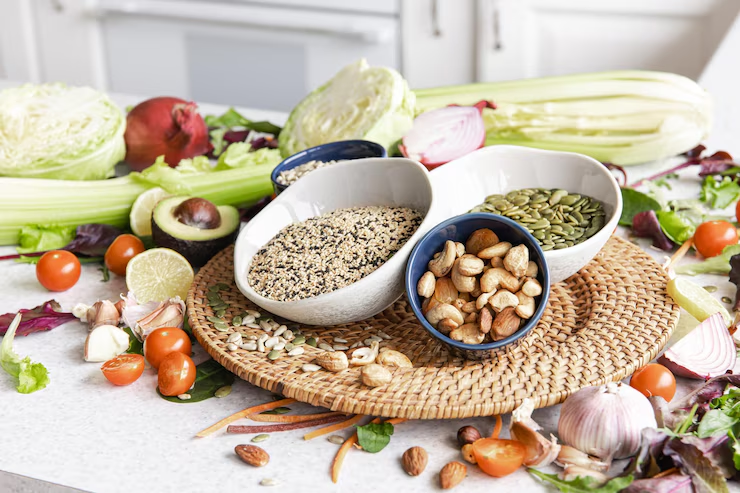
Fiber is essential for digestion, satiety, and overall health in a low calorie vegetarian meal plan. High-fiber foods like vegetables, fruits, legumes, and whole grains help you feel full longer, control appetite, and maintain stable blood sugar levels. Including fiber-rich foods in every meal also supports a healthy gut microbiome and reduces the risk of chronic diseases such as heart disease and diabetes.
For example, adding lentils, chickpeas, or chia seeds to salads and soups significantly increases fiber intake. 🌿 Fruits like apples, berries, and pears make excellent snacks that are low in calories but high in fiber, keeping you satisfied between meals. Fiber works synergistically with other nutrients in your low calorie vegetarian meal plan, making your meals nutrient-dense and filling.
Additionally, fiber promotes digestive health by preventing constipation and supporting regular bowel movements. It also aids in detoxification and improves overall gut function. Including fiber-rich foods consistently ensures that your low calorie vegetarian meal plan is effective for weight management, satiety, and overall wellness.
Include Variety for Nutritional Balance 🌈
Variety is crucial in a low calorie vegetarian meal plan to prevent nutrient deficiencies and maintain long-term adherence. Rotating vegetables, protein sources, grains, and healthy fats ensures a diverse intake of vitamins, minerals, and antioxidants. A diverse diet also keeps meals exciting and reduces diet fatigue, which is essential when following a low-calorie plan.
For example, alternating between lentils, chickpeas, and tofu for protein, or switching between quinoa, oats, and brown rice for carbohydrates, ensures a broad nutrient profile. 🌟 Different colored vegetables and fruits provide various phytonutrients, enhancing immunity and supporting overall health. A well-balanced low calorie vegetarian meal plan combines variety and nutrient density, making meals both satisfying and functional.
Additionally, variety encourages creativity in meal preparation. Experimenting with herbs, spices, and cooking methods keeps meals flavorful without adding excess calories. By including diverse foods, your low calorie vegetarian meal plan becomes sustainable, nutritionally complete, and enjoyable for the long term.
Plan Portion Sizes Carefully 📏
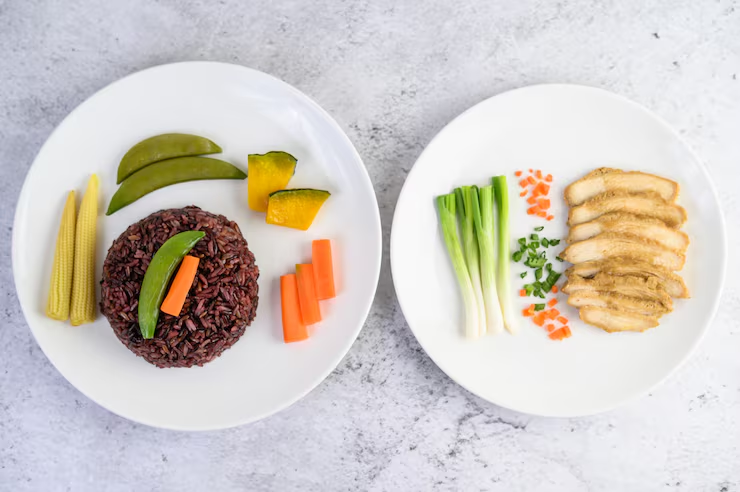
Even healthy foods can contribute to excessive calorie intake if portions are not controlled. In a low calorie vegetarian meal plan, measuring portions of grains, nuts, seeds, and protein sources is crucial to maintain a calorie deficit while meeting nutritional needs. Controlled portions also help prevent mindless overeating and keep your weight management goals on track.
For example, limiting nuts to a small handful or keeping a cup of cooked quinoa as a serving ensures that meals remain low in calories. 🌿 Portion control allows you to enjoy diverse foods without exceeding your calorie target. Combining portion awareness with nutrient-dense foods enhances the effectiveness of your low calorie vegetarian meal plan.
Mindful eating practices complement portion control. Eating slowly, focusing on hunger cues, and avoiding distractions during meals prevents overconsumption and improves digestion. By planning portion sizes carefully, your low calorie vegetarian meal plan becomes more structured, sustainable, and aligned with your health goals.
Stay Hydrated and Practice Mindful Eating 🥤
Hydration is a vital component of a low calorie vegetarian meal plan. Drinking water throughout the day supports digestion, reduces hunger, and aids in metabolism. Herbal teas, infused water, and low-calorie beverages can enhance hydration while keeping calorie intake low. Staying hydrated also prevents confusion between thirst and hunger, helping you avoid unnecessary snacking.
Mindful eating, which involves paying attention to hunger cues, eating slowly, and savoring each bite, complements hydration. 🌟 This approach increases meal satisfaction, reduces overeating, and fosters a healthy relationship with food. Mindfulness also encourages intentional food choices and improves overall awareness of dietary habits, enhancing the effectiveness of a low calorie vegetarian meal plan.
Together, hydration and mindfulness create a holistic approach to diet. They improve digestion, boost energy levels, and make low-calorie meals more enjoyable. Incorporating these practices ensures that your low calorie vegetarian meal plan is not only effective for weight management but also supports overall wellness and long-term sustainability.
Conclusion
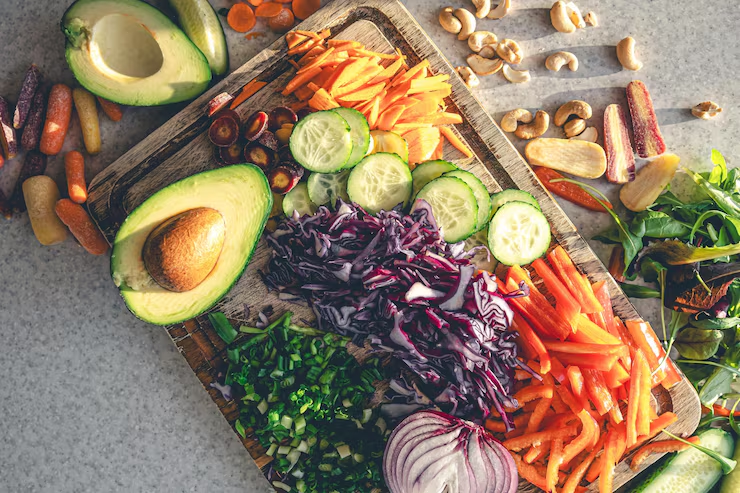
Adopting a low calorie vegetarian meal plan is a positive and effective way to achieve long-term health and wellness. By focusing on nutrient-dense, low-calorie plant-based foods, you can maintain a healthy weight while enjoying a diverse and flavorful diet. This approach is sustainable, enjoyable, and suitable for people with busy lifestyles who want to prioritize health without sacrificing taste or satisfaction. 🌿
Moreover, a low calorie vegetarian meal plan provides comprehensive health benefits beyond weight management. Regular consumption of vegetables, fruits, whole grains, legumes, and healthy fats improves heart health, boosts digestion, enhances energy levels, and strengthens immunity. By making mindful choices and balancing macronutrients, you can create meals that are both satisfying and nourishing. 🥗
Finally, following a low calorie vegetarian meal plan encourages a mindful, environmentally conscious lifestyle. Choosing plant-based foods reduces your carbon footprint, supports sustainable farming practices, and promotes ethical consumption. Combined with portion control, hydration, and variety, this plan empowers you to take charge of your health and well-being. 🌟 With dedication, creativity, and consistency, a low calorie vegetarian meal plan can transform not only your diet but your overall approach to life, making healthy living accessible, enjoyable, and sustainable for everyone.
FAQs
Q1: Can a low calorie vegetarian meal plan provide enough protein for daily needs?
Yes, a low calorie vegetarian meal plan can meet your protein requirements when it includes protein-rich plant foods like lentils, chickpeas, beans, tofu, tempeh, and quinoa. Combining different plant proteins throughout the day ensures all essential amino acids are consumed, supporting muscle maintenance and overall health. 🌿
Q2: Will following a low calorie vegetarian meal plan lead to nutrient deficiencies?
Not if planned carefully. A low calorie vegetarian meal plan that includes a variety of vegetables, fruits, legumes, whole grains, nuts, and seeds provides essential vitamins, minerals, and fiber. Including fortified foods or supplements may be considered for nutrients like vitamin B12, vitamin D, and omega-3 fatty acids. 🌱
Q3: How can I make my low calorie vegetarian meal plan more satisfying?
To make a low calorie vegetarian meal plan satisfying, focus on high-fiber foods, protein-rich meals, and a variety of flavors and textures. Using herbs, spices, and small portions of healthy fats adds taste without increasing calorie content. Eating slowly and mindfully also enhances satiety. 🥗
Q4: Is a low calorie vegetarian meal plan suitable for weight loss?
Absolutely! A low calorie vegetarian meal plan is designed to reduce calorie intake while providing essential nutrients. Consistently following the plan, combined with regular physical activity, promotes healthy weight loss without causing fatigue or nutrient deficiencies. 🌟
Q5: How often should I rotate foods in a low calorie vegetarian meal plan?
It’s best to rotate foods daily or weekly. A low calorie vegetarian meal plan that includes different vegetables, proteins, and grains prevents boredom, ensures balanced nutrient intake, and improves adherence. Variety also boosts the intake of antioxidants and micronutrients. 🌈


